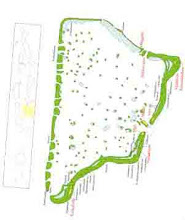 In 1997 I did a study trip to Egypt with a group of 29 stagiares from the European Commission. In our group, we had nice Australian fellow (nicked name as the Antipodean), who had the energy to write a trip diary. Allow me to share a few parts of it. Before that, simply words about Esna: The present Egyptian village of Esna, which was ancient Iunyt or Ta-senet (from which the Coptic Sne and Arabic Isna derive), was built in the area of ancient Latopolis and is the site of a major temple dedicated to the god Khnum. Under the Greeks and Romans, the city became the capital of the Third Nome of Upper Egypt. Besides Khnum, the temple was dedicated to several other deities, the most prominent of whom were Neith and Heka. Esna is located on the Nile about fifty kilometers south of Luxor. The temple now stands in the middle of the modern town at a level about nine meters below that of the surrounding grounds and the temple Khnum is the major (unique) attraction of Esna.
In 1997 I did a study trip to Egypt with a group of 29 stagiares from the European Commission. In our group, we had nice Australian fellow (nicked name as the Antipodean), who had the energy to write a trip diary. Allow me to share a few parts of it. Before that, simply words about Esna: The present Egyptian village of Esna, which was ancient Iunyt or Ta-senet (from which the Coptic Sne and Arabic Isna derive), was built in the area of ancient Latopolis and is the site of a major temple dedicated to the god Khnum. Under the Greeks and Romans, the city became the capital of the Third Nome of Upper Egypt. Besides Khnum, the temple was dedicated to several other deities, the most prominent of whom were Neith and Heka. Esna is located on the Nile about fifty kilometers south of Luxor. The temple now stands in the middle of the modern town at a level about nine meters below that of the surrounding grounds and the temple Khnum is the major (unique) attraction of Esna.Monday 23, June 1997, Esna:
If paradise is desert and 40º, then we are in heaven. But by “paradise” I mean in a socio-cultural sense, enthusiasm, energy and harsh reality in stark contrast to the scorched Earth (10 mm of rain every 5 years). Esna, is not a big village, but is the village where many of the river boats come to roost. The river boats themselves have flat bottoms and dock next to each other, so you have to often walk through many boats before you get to your own. The boats resemble hotels – huge chandeliers, kitch décor, and Italian furniture, but these were no match for the psychedelic fountain on the Nile Crown. We set off to explore the old word, but it come to us; drivers, traders and kids. One man offered 2 billion camels for one girl – there were 24 women to 5 men on the bout – so this seemed a good deal, especially as we had a few to spare. It was an offer we were to decline many times during the trip. Many kids followed us and asked for “baksheesh” the ancient a noble art of tipping in Egypt – we were become very accustomed to this practice. We were cut off in the streets by “kalesh” drivers seeking a fare (taxi drivers in a horse and carriage) and everyone jostled for a piece of the tourist action. Just outside our boat 3 men smoked a water pipe called a “shisha”, but this practice is limited to the Egyptian men. The cultural dive was gaping at first but by the end of the trip, there were a few stagiaires not resplendent in Egyptian jewllery, djalabahs, or appropriate headdress. As a study trip, we now appreciate Egyptian commerce and its dress sense. But on this first day we were sent scurrying back to the safety of our boat by the heat and the intensity of the locals around us, but this initial taste lefts us thirsting for more. After our first experiences we eagerly packed our survival kit (camera, sunscreen, travel guide and water) for the legendary “valley of the Kings”.
















Sem comentários:
Enviar um comentário